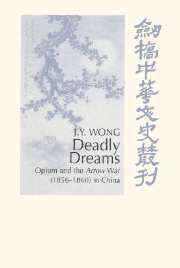Book contents
- Frontmatter
- Contents
- List of Tables
- List of Figures
- Poem by the late Mr Qin Esheng
- Foreword by Professor Wang Gungwu
- Foreword by Professor C. A. Bayly
- Preface
- Part I The confusion of imperialism
- Part II The pretext for imperialism
- Part III The personalities of imperialism
- Part IV The rhetoric of imperialism
- 7 Marx, Punch, and a political press: The debate among the British newspapers
- 8 The Arrow incident and international law: The debate in the House of Lords
- 9 Triumph of the liberal conscience: The debate in the House of Commons
- 10 ‘Johnny’ is on his knees: The ‘Chinese Election’
- Part V The mechanics of imperialism
- Part VI The economics of imperialism
- Part VII The dynamics of imperialism
- Chronology of major events
- Word list
- Abbreviations
- Bibliography
- Index
8 - The Arrow incident and international law: The debate in the House of Lords
Published online by Cambridge University Press: 29 September 2009
- Frontmatter
- Contents
- List of Tables
- List of Figures
- Poem by the late Mr Qin Esheng
- Foreword by Professor Wang Gungwu
- Foreword by Professor C. A. Bayly
- Preface
- Part I The confusion of imperialism
- Part II The pretext for imperialism
- Part III The personalities of imperialism
- Part IV The rhetoric of imperialism
- 7 Marx, Punch, and a political press: The debate among the British newspapers
- 8 The Arrow incident and international law: The debate in the House of Lords
- 9 Triumph of the liberal conscience: The debate in the House of Commons
- 10 ‘Johnny’ is on his knees: The ‘Chinese Election’
- Part V The mechanics of imperialism
- Part VI The economics of imperialism
- Part VII The dynamics of imperialism
- Chronology of major events
- Word list
- Abbreviations
- Bibliography
- Index
Summary
The House of Lords had some of the greatest legal minds in the world. The law lords therein constituted the highest legal authorities in the British Empire. It was not by coincidence, therefore, that Lord Derby, who moved a censure resolution against the government on account of the bombardment of Canton, began the China debate on 24 February 1857 by appealing to their lordships ‘to deal with the question in a purely judicial spirit’.
It is fascinating to see their lordships thresh out the legal complexities of the case of the Arrow, and thence what some of them regarded as the origins of the war. That protracted debate may be boiled down to the following major issues: whether the British flag was flying; whether an insult was intended; whether the Arrow was entitled to fly the British flag; the expiry of the Arrow's register; abuses of the colonial ordinance whereby the Arrow's register had been granted; whether the actions of Parkes, Seymour, and Bowring were justified; whether Bowring had acted in the best interest of the nation; the Canton City question; the right to make war; whether it was a just war; whether the debate was motivated by justice and humanity or by party politics; and how important the China trade was.
One may put these various issues into three main categories: legal technicalities, issues of justice and humanity, and trading matters.
- Type
- Chapter
- Information
- Deadly DreamsOpium and the Arrow War (1856–1860) in China, pp. 174 - 192Publisher: Cambridge University PressPrint publication year: 1998



